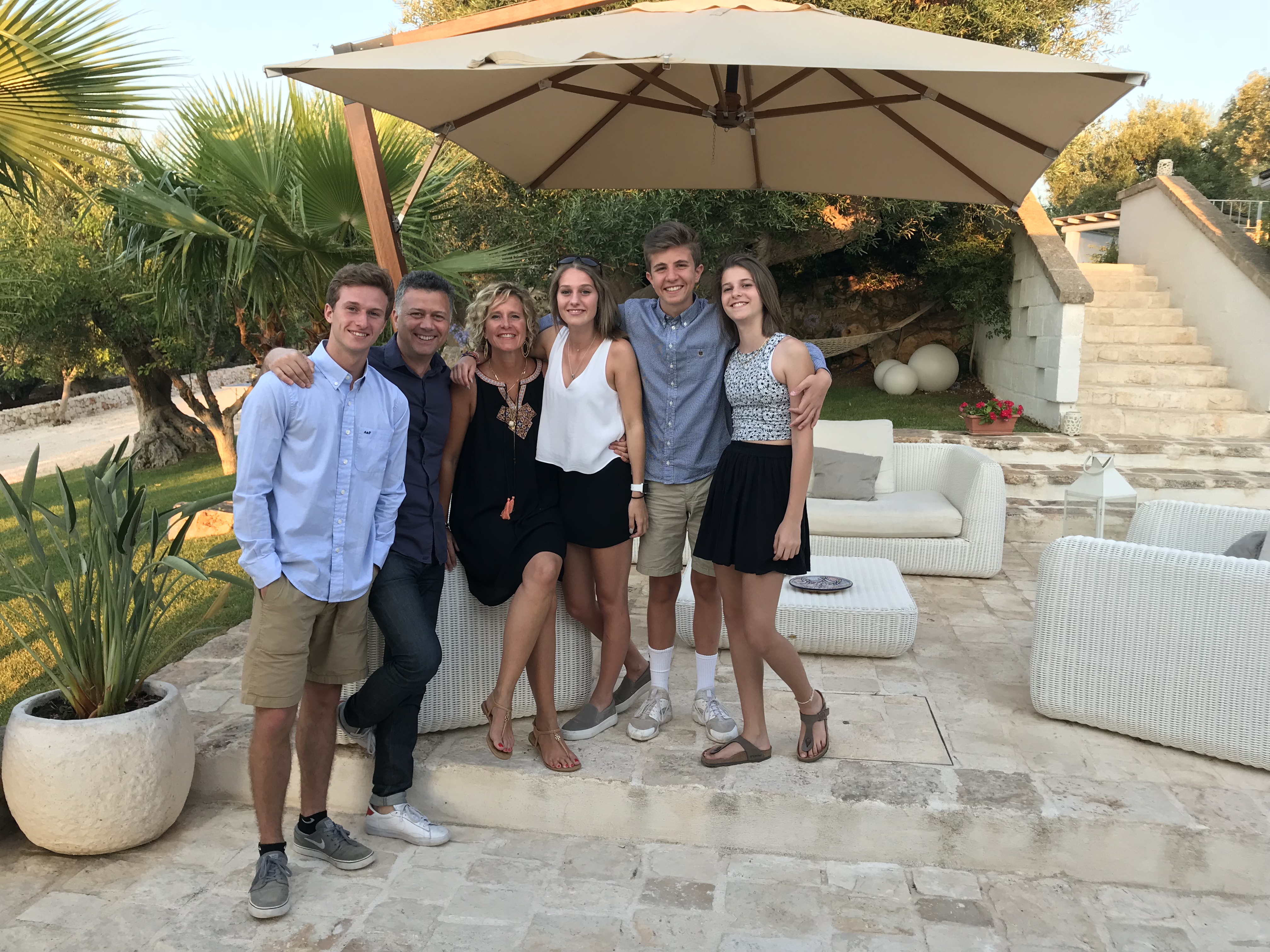One of my favorite childhood memories was our weekly escape to Assinie from the dust, rust, and noise of Abidjan.
Waves and currents from the north Atlantic ocean had created low-lying sandbars which were dotted with coconut palms and shrubs. The sand was golden on one side, overlooking the ocean, and a dark muddy brown on the other, seeping into a dark green lagoon with quiet narrow waterways that paralleled the sea. The only access, at the time to this paradise, was by boat.
Dad bought a piece of this bank of golden white sand off the local chef du village. He had some of the local villagers build paillottes on the land. These were straw roofed man-made simple huts. It had become the thing to do amongst wealthy Ivoiriens, French locals and foreigners; us being the latter. These humble abodes were built in such a beautiful setting for practically next to nothing. We had seven of them in total, including one to house our guardien, his wife and his six children. The guard’s name was Mubu and he was a kind but lazy man who Dad hired to guard the place all year round from squatters. There was a main living paillotte, for the kitchen, dining, and sitting area. This main space was completely open, no doors, no windows. The walls were built from bamboo, the thatched roofs from dried palm leaves. There were four sleeping huts, each with enough beds to sleep four. Each bed had a large mosquito net hanging above to prevent sleepers from being bitten. I remember one time I forgot to tuck the netting under my mattress – that’s how we’d assure to be completely protected. I woke up in the middle of the night in a scratching frenzy. The following day I was plastered with so many welts it looked like I had the measles.
Due to the damp, Mum brought freshly washed white cotton sheets and blankets back and forth every weekend. If left there, they would be moth ridden in just a week. Mum loathed moths even more than cockroaches so would put moth balls everywhere to keep the fluttering insects at bay. I remember the sweet yet pungent smell to this day.
There were two smaller huts, one for the shower and one for the toilet. Dad rigged a water tower to hold two large plastic containers full of water. The water was pumped from below the sand into the barrels. An irrigation feat in itself. When the water ran, it ran reddish brown. I remember dreading shower time. Between the dirty color, the smell of muddy water and the nasty taste in the back of my throat, the experience was unpleasant, to say the least. The toilet was Mum’s pride and joy being the only private paillotte with a flushable one.
We drove to Assinie every weekend. On Saturday mornings, before the sun began to warm the roofs of the houses, Mum, Dad, my little brother Simon, Quinn, our crazy cocker spaniel and I would jump into our white Peugeot 205 for the eighty kilometer drive. It was a two hour intense journey and Dad was always a little nervous before the trip. The time we left home was crucial; if we left it any later it could take up to four hours due to the dense build up of traffic leaving Abidjan.
Not ten minutes into our journey, we got stuck in traffic, unsurprisingly, despite our early departure. Abidjan traffic was notorious for being slow. However, even at this early hour, ten minutes of free flowing traffic was a record. I didn’t mind. I loved staring out the window and watching the muffled, fogged up, dusty yet colorful world pass me by. Even if it was in slow motion.
The hot hazy sun was now rising and was already well above the low rise buildings. It shone an orange light giving it a sepia colored photograph effect I’d seen in some of Mum’s old photographs. I knew that the honking of horns would be deafening if it wasn’t for the gentle hum of the car’s air conditioning. I remember feeling grateful that Dad had a job that afforded this luxury. Squished up in my little space, forehead pressed against the window, I soaked in the outside world. There were countless people hurrying about their busy lives, coming and going from places like the early morning market, or Saturday school, or maybe even church, I remembered thinking.
I saw the familiar sight of strong mothers carrying their babies on their back, whilst balancing their shopping in wicker baskets on their heads. The colors of their kaftans were bright and beautiful. It fascinated me to watch them walk majestically in vibrant blues, fuchsia pinks, scarlet reds through the city.
There were children playing on busy intersections, dressed in hand-me-down clothes, chasing each other around, most of them with huge grins on their grubby faces. They played with wire cars, toys, and bicycles. Made by their very own hands from recycled tin cans, wire, plastic bottles, old milk cartons, and other scraps. I caught sight of a small boy with barely any clothes on. He was wearing just a grey pair of boxers which had seen a whiter day. He had green ooze dribbling from his nose with his belly protruding over skinny legs. I remember this troubled me. I wondered how he had got there and where his parents were.
Dad had the Abidjan traffic down to a tee. His calm demeanor got him through the frenzy of traffic with ease. With the multitudes of Honda and Toyota clapped out cars swerving in and out of lanes he had to keep his concentration. They beeped their horns, shouted and egged the traffic to move along.
“Patience is the key” he would say whilst letting in one of the many scooters with an entire family piled onto it, including a goat. There were bicycles too. All sorts of shapes, colors, and sizes. Most of them were old and scrappy but some were shiny and new which stuck out like sore thumbs.
Mum and Dad were quietly conferring about something I couldn’t quite catch from my tight spot in the back seat of the car. “…Zeni…..new mattress.”
Zeni was the domestic help who lived with us in Abidjan. He would go and visit his family in Burkina Faso every time we left for Assinie. Quinn was fast asleep on the back shelf of the car, dreaming of chasing crabs and jumping over waves. He loved Assinie as much as we did.
Simon was fiddling with a piece of string concentrating hard on Jacob’s ladder or Cats Cradle. Why he had decided to do that in the car, I wasn’t sure. He was prone to carsickness. I remember that anytime we traveled by plane Mum insisted on collecting sick bags for him – the paper ones slotted in the pocket in the seat in front of you. He never went on a car journey without tucking one of two of them inside his bag.
Soon, the traffic dispersed and we picked up speed. We passed by Carrefour, the big French supermarket, local market stalls, shacks, and office buildings. Before hitting the bush road, we made a quick stop at the local boulangerie, Maison du Pain, to grab fresh, mouth-watering pain au chocolat for the journey, and a fresh baguette for the weekend. The road was made out of red mud. Laterite mud. When it rained it became a soggy red pool. Dad, being his usual precautionary self, made sure he had two spare tires in the back of the car in case we fell into one of the deep pot-holes in the road. The road stretched over a piece of jungle that was isolated. I had heard that many families like us carried a gun for their protection when they traveled this route. When Mum asked him, one day, if he should get himself one, his words were loud and clear.
“If I ever feel the need to carry a gun, it will be our time to leave Africa.”
I plugged my headphones into my brand new walkman, closed my eyes and dozed off listening to Pink Floyd’s “Another Brick in the Wall” and Blondie’s “Call Me”.
After what seemed only a few minutes, I woke up to Dad’s elevated voice as he pulled the car to the side of the road.
“Just stopping off for some supplies.” he said cheerily.
I recognized where we were. The familiar colorful, wooden shack looked inviting from the outside with freshly picked mangoes and juicy pineapples for sale. I also remember the Johnny Walker whiskey bottles filled with peanuts. It was like any other shack along any of the roads in this part of Cote D’Ivoire. It was lopsided, as if it would topple over at any moment, and laden with anything and everything with careless abandon. On either side of the shack there was nothing but tall grasses, coconut trees, and bush. Despite the exterior of colorful fruit, it felt remote and not a place to hang around. Dad was twitchy. His hands were moving around a lot more than usual and were drumming on the steering wheel. I could feel that he wanted to get this business done with quickly and get back on the road.
“Kids, honey, stay in the car. I’ll be back soon,” he said getting out of the car.
I had already hopped out of the car and was by his side in a quick second.
“I thought I told you to stay in the car Samantha” he repeated. “It’s not safe”
He looked at Mum questioningly as if to ask was it ok to take me with him. I could see Mum give him a thumbs up and saw her mouth “Go quickly. Get on with it”.

to be continued…..



Love the evocative description Sam! And the nervous energy! Looking forward to the next installment!
Thanks June. I’ll be posting the next one in the next few days.
Such a vivid description – I feel like I’m there when reading it. More please!
The imagery you have in this is so good!! Makes me feel like I’m in the story when i read it. Let me read more!!!!
I await with anticipation to see what your memory/imagination comes up with next. Highly evocative story about wonderful memories!
Dad
XX
Part 2 coming out tomorrow! Watch this space!
More please! I’m enjoying the suspense.
Love seeing your Dad commenting and I wonder if his memory recalls the same as yours?
Hi Victoria, such an interesting point! Memories are so personal. Even when 2 people have gone through the same thing they will remember it differently.
I really like part two. It’s funny finding out how dad and you behaved when you where young.
Thank you William!